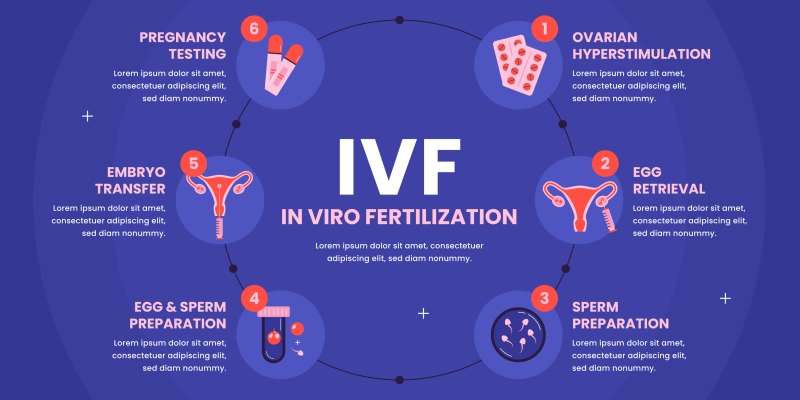Author : Dr. Babita Rajesh Chauhan
MBBS, MD(OBG)
Consultant – Obstetrician & Gynecologist
Navigating Infertility – A Roadmap to Hope and Parenthood
India, grappling with a silent yet significant issue, faces a rising tide of infertility challenges. Traditionally celebrated for its family-centric culture, the nation is now confronting an increasing number of couples struggling to conceive. According to Dr. Babita Rajesh Chauhan, MBBS, MD(OBG), Consultant – Obstetrician & Gynaecologist , This article aims to shed light on infertility in India, offering a beacon of hope and guidance to those navigating this complex journey.
Understanding infertility is crucial in this pursuit. Infertility, often shrouded in misconceptions and social stigma, needs demystification. It’s not just a medical condition but a multifaceted challenge involving emotional, social, and physical aspects.
Understanding Infertility
Infertility, defined as the inability to conceive after a year of unprotected intercourse, manifests in two primary forms: primary and secondary. Primary infertility refers to couples who have never conceived, while secondary infertility denotes difficulties in conceiving following a previous pregnancy.
The causes of infertility in India are diverse, ranging from genetic to lifestyle-related factors. Biological issues such as ovulation disorders, fallopian tube damage, and low sperm count are common. However, lifestyle factors like stress, obesity, and environmental influences also play a significant role. Moreover, societal factors like late marriages and postponed childbearing are contributing to the rising infertility rates in India.
Treatment Options
In India’s dynamic medical landscape, several infertility treatment options have emerged, offering renewed hope to couples. These treatments range from conventional methods to advanced reproductive technologies.
IVF (In Vitro Fertilization): IVF stands as a beacon of hope for many. It involves fertilizing an egg outside the body and implanting the embryo into the uterus. IVF’s success in India has been a game changer, especially for couples with blocked fallopian tubes or severe sperm dysfunction. Its procedure, intricately tailored to individual cases, involves hormone treatments, egg retrieval, fertilization, and embryo transfer. The process, while complex, has opened doors to parenthood for many who had almost given up hope.
Adoption and Surrogacy: Beyond medical interventions, adoption and surrogacy offer alternative pathways to parenthood. Adoption, though sometimes tangled in bureaucratic procedures, presents a noble opportunity to provide a loving home to a child in need. Surrogacy, a more recent and complex option, involves a surrogate carrying a child for another couple. This method, regulated to protect the rights of all parties involved, requires careful legal and ethical considerations. Both these options embody the essence of parenthood, extending beyond biological boundaries to embrace a deeper, more inclusive definition of family.
These treatments, while promising, come with their own sets of challenges and implications.
Challenges and Solutions
Emotional and Social Challenges: Infertility often brings an emotional whirlwind, marked by feelings of inadequacy, frustration, and isolation. In India, where familial and societal expectations about childbearing are deeply ingrained, couples may experience heightened social pressure and stigma. This emotional turmoil can strain relationships and lead to mental health issues like depression and anxiety.
To navigate these challenges, seeking emotional support is essential. Counseling and therapy can offer a safe space for couples to express their feelings and cope with stress. Support groups, both in-person and online, provide a sense of community and understanding, reminding couples that they are not alone in their journey.
Financial Challenges and Solutions: The financial aspect of infertility treatments like IVF or surrogacy can be daunting. These procedures, often requiring multiple cycles, can strain a couple’s finances. In India, where insurance coverage for infertility is still evolving, the burden can be significant.
However, solutions exist. Some hospitals and clinics offer financial planning assistance or payment plans to make treatments more accessible. Organizations and charities sometimes provide grants or subsidies for couples in need. Furthermore, exploring cost-effective treatment options and being well-informed about the expenses involved can help couples prepare financially for their journey towards parenthood.
These challenges, though significant, are not insurmountable. With the right support and resources, couples can find their way through the complexities of infertility.
Community and Support
Support Groups and Resources: In India, support groups for infertility play a pivotal role. They offer not just emotional support but also practical advice and information. These groups, facilitated by healthcare professionals or experienced couples, can provide guidance on navigating treatment options, dealing with societal pressures, and maintaining emotional well-being.
Additionally, online forums and social media platforms have emerged as valuable resources. They offer a platform for sharing experiences, finding comfort in shared stories, and receiving encouragement from others who have walked a similar path. These communities break the silence around infertility, fostering a more open and supportive environment.
Role of Healthcare Providers: Healthcare providers in India are increasingly acknowledging the importance of holistic support for couples facing infertility. Clinics and hospitals are offering counseling services, educational workshops, and holistic care programs. These initiatives aim to address not just the medical but also the emotional and psychological needs of couples.
For instance, Motherhood Hospitals, with their comprehensive approach to infertility treatment, offer both advanced medical care and emotional support, recognizing the multifaceted nature of this journey. They serve as an exemplar of integrated care, combining expert medical treatment with compassionate support.
In conclusion, the path through infertility, though fraught with challenges, is illuminated by the support of a compassionate community and the guidance of dedicated healthcare providers. Motherhood Hospitals stand as a beacon in this journey, offering hope and comprehensive care to those navigating the complexities of infertility in India.
Dr. Babita Rajesh Chauhan will respond to your query as soon as possible. For emergencies please call and reach Motherhood Hospital, Mohali.
At Motherhood Hospitals, we have a team of experienced supers specialists backed by the latest infrastructure and facilities. We have the best gynecologist in Mohali. We are experts in handling complex deliveries, gynecological, and other surgeries including a range of laparoscopic surgeries.
Do make an appointment with the best woman care hospital in Mohali at a center closest to you. Please meet with our doctors who will carry out the required investigations, diagnose the issue, and recommend the most appropriate treatment, enabling you to lead an active life.
If you wish to get in touch with Dr. Babita Rajesh Chauhan, please book your appointment here.


 Toll Free Number
Toll Free Number
















